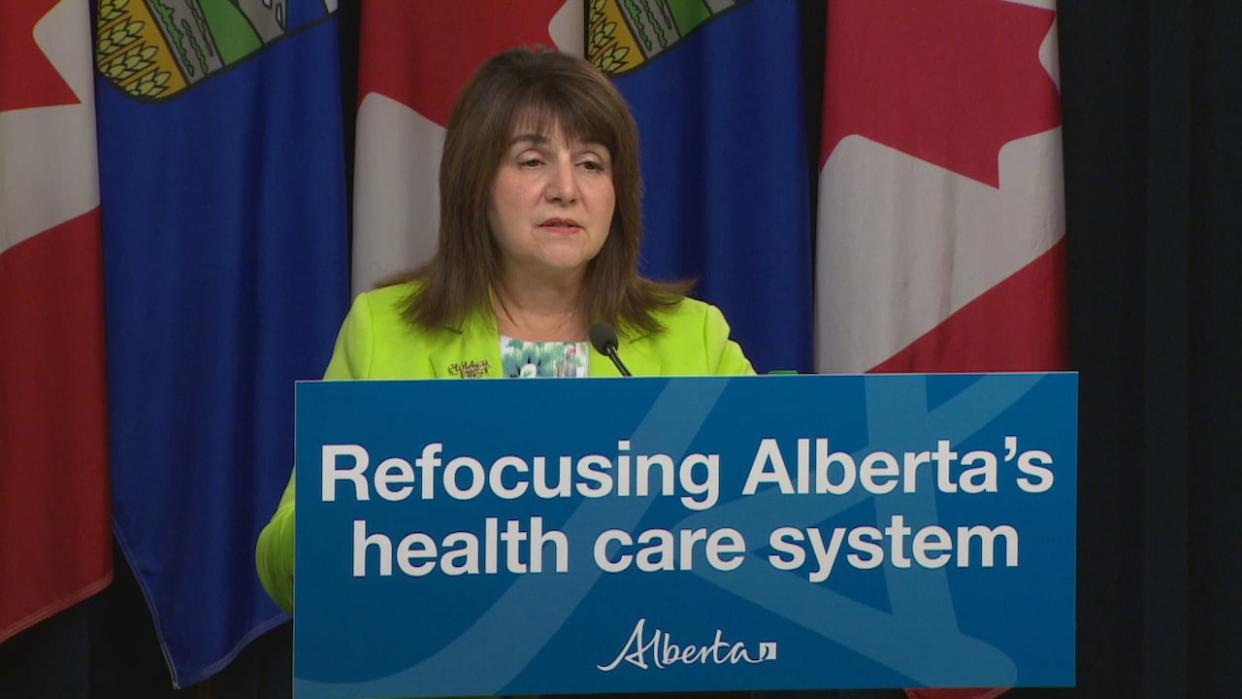Health minister introduces bill to split up Alberta Health Services

The UCP government introduced a bill on Tuesday that will break Alberta Health Services into four separate organizations overseeing mental health and addictions, acute care, primary care and continuing care.
Bill 22, the Health Statutes Amendment Act, enables a vision for an improved health care system that is "ambitious yet attainable," Health Minister Adriana LaGrange said.
"We are poised to usher in an era of efficiency, accessibility and patient-centred care," LaGrange said at a news conference.
"The amendments proposed in this act are not just bureaucratic changes. They represent a fundamental shift in how we approach health care in Alberta."
Bill 22 lays out the governance of the new organizations and allows government to move employees to the new organizations.
The bill designates the minister of health as "oversight minister" of the entire system. The minister can designate other ministers to be "sector ministers" to run the four new organizations.
If the legislation passes, Dan Williams, the minister of mental health and addictions, would be in charge of Recovery Alberta, the new organization overseeing that part of the health-care system.
As minister of health, LaGrange would serve as oversight minister. She would also be the sector minister for the organizations running acute care, primary care and continuing care.
LaGrange said workers would stay with their current unions and be governed by the same collective agreements. No job losses are expected, she added.
If the bill passes, Recovery Alberta would be up and running this summer with about ten thousand employees transferred from AHS. The plan is for the other three organizations to be operational by the fall.
LaGrange said the changes should attract physicians, nurses and other health-care professionals to Alberta since they would be able to focus on delivering care under the new model.
She said current employees expressed those sentiments during the telephone town halls held earlier this year.
"They're excited by the possibilities," LaGrange said. "There's hope that the work that they're doing will in fact produce better results and they can really use their skills to their full potential."
NDP health critic Dr. Luanne Metz said the bill is another example of how Premier Danielle Smith is trying to centralize control in her office.
She said that when the plan was leaked to the NDP last fall, the document listed several risks, including "service disruption/failure" and "potential to fragment care delivery."
"This is a blueprint to escalate the chaos in our hospitals and clinics and will do nothing to improve results for patients or support staff," Metz said in a written statement Tuesday.
"Danielle Smith wants to control everything, everywhere, all at once, and this Frankenstein of a bill will continue the dismantling of Alberta Health Services and stuff patients and providers into ineffective silos."
David Harrigan, director of labour relations for the United Nurses of Alberta, said the idea that nurses are going to come to a province that is upending its health-care system is "ludicrous."
He said new graduates aren't interested either.
"They're saying 'why on earth would I go to Alberta?'" Harrigan said. "Alberta used to be the highest paid. We're now about number four and they're dissolving the system. I think it's going to make it much more difficult to attract them."
UNA filed an unfair labour practices complaint with the Alberta Labour Relations Board last month over plans to move nurses to Recovery Alberta. Harrigan said the dispute hasn't yet been resolved so they have asked for hearing days next month.
Harrigan said the nurses' collective agreement states that nurses can either transfer to the new organization or stay with AHS. But the language in Bill 21 allows the minister to make an order forcing people to transfer, he said.


